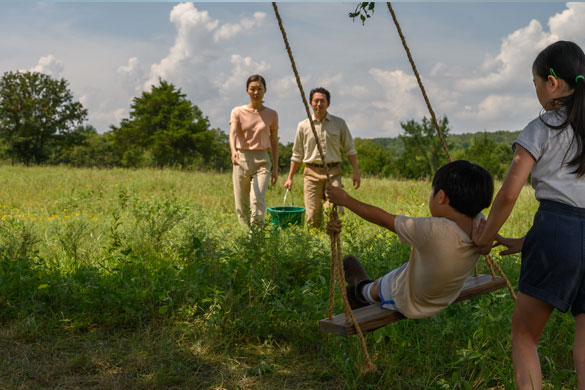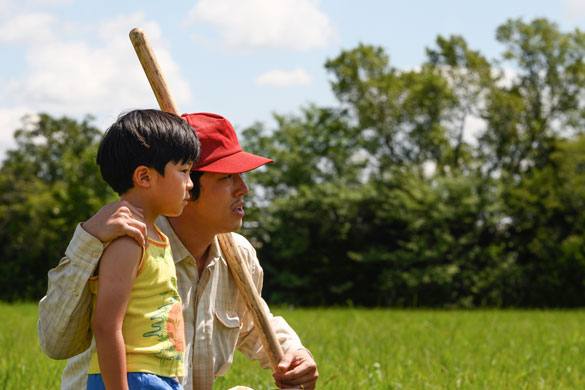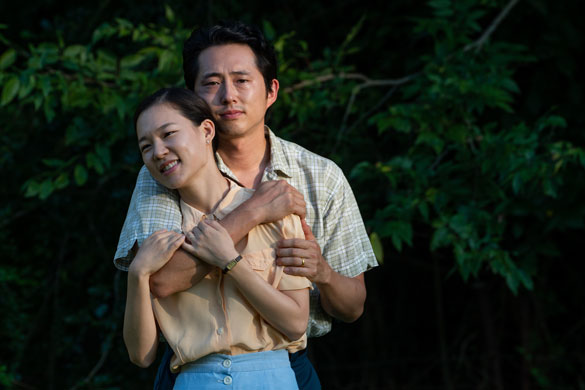
 |
||||
It’s the 1980s. Jacob Yi (Steven Yeun) and his wife, Monica (Han Ye-ri), are a Korean immigrant couple living in the US who decide to move from California with their two young children to the more open spaces of rural Arkansas, both as a ‘fresh start’ and to allow Jacob to try to realise his dream of setting up a farm growing Korean produce to sell. While Monica is trying to be supportive of her husband’s plan she can barely hide her scepticism and fear, not least when she first lays eyes on her new ‘home’ which is a far cry from what Jacob had promised.
Review: Minari begins as Jacob drives his wife and children through an increasingly rural Arkansas landscape to the location of their new home and what he’s clearly sure will soon be a thriving, lucrative farming endeavour. The look of abject disappointment on Monica’s face on seeing that the supposed house is nothing more than a trailer on wheels (that same disappointment physically stopping her dead in her tracks as she steps out of the car) not only instantly underlines the scepticism in Jacob’s plan that will quickly grow within her, in spite of her trying to support her husband as best she can, but also no sooner does she frustratedly complain that “This isn’t what you promised!” to which Jacob somewhat dismissively replies “We decided we wanted a fresh start. This is it!” than we are given an early foreshadowing of differences in their priorities for personal and family life: Monica, as a loving mother, daughter and wife has her family at the centre of her focus (wanting all to have the best and happiest lives they can without seemingly endless and, from her point of view, almost unacceptable sacrifices) while Jacob is increasingly shown to almost shrug off any hardships his family must face as long as they ultimately result in the success of his farming business. Sure, consciously he can tell himself that his outlook will (hopefully) result in the family being far better off in the long-term but you need only scratch the surface of his psyche to realise his actions are as much from a personal need to prove himself to be a success and indeed prove that his sometimes desperate decisions in favour of the farm warrant the sacrifices they force the family into, whether you look at the fact that he prioritises getting water pumped to his growing yet parched farm produce above having running water in the trailer/home (while his kids and elderly mother-in-law have to trek to a country creek to fill buckets from it, keeping them in the home for washing etc.); he lies to Monica when the house water stops running, stating that he’ll check the pipes while he (and Monica) are both wholly aware that there just isn’t enough money to keep water flowing to both the farm and home; or indeed look at him arriving late to a hospital appointment to discuss his son’s heart condition carrying a box of Korean vegetables with him into the surgery room (against Monica’s express wishes), having failed to find a parking space in an area cool enough to keep them safe from spoiling from heat.
While these differences in perspective and focus are of course a core and growing part of this family’s story and vital the characters’ individual (and combined) arcs, director Lee Isaac Chung deftly and indeed exquisitely weaves them within the minutiae of everyday life, repeatedly showing that the seemingly tiniest of moments can escalate feelings of separation if left unchecked, unspoken or ignored.
All of the above combines with top notch performances from an exemplary cast (young and old alike), superlative cinematography, a beautifully flowing and ultimately soaring musical score and a perfectly understated directorial style to create a nuanced tale of a struggling family that feels absolutely real from start to finish and guaranteeing that we as viewers not only invest in the characters entirely but also ultimately truly care about their hopes and dreams, genuinely feeling for their problems/plight with our fingers firmly crossed for their future.
UK Release Details:
|
||||
All images © Altitude Films, A24, Plan B Review © Paul Quinn |
||||



